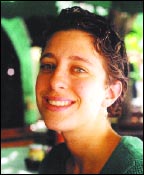CAROLINE
BETTINGER-LOPEZ
By Ron Beasley
 Caroline
Bettinger-Lopez decided to take a close look at Miami's Cuban
Jewish community as part of her college senior thesis. The
project evolved into a book that will be released in October
and set her on a career path to become an immigration lawyer.
Caroline
Bettinger-Lopez decided to take a close look at Miami's Cuban
Jewish community as part of her college senior thesis. The
project evolved into a book that will be released in October
and set her on a career path to become an immigration lawyer.
Bettinger-Lopez, a Pinecrest
native and 1994 graduate of Palmetto Senior High School, said
the idea for her book -- Cuban Jewish Journeys: Searching
for Identity, Home and History in Miami materialized near
the end of her junior year at the University of Michigan.
"I was an anthropology major
and in my junior year I became interested in looking at issues
of identity, community and culture," she said. "I decided
that an interesting place to look at this would be the Cuban
community of Miami.
"The Cuban Jewish community
for me had personal significance," she continued. "I grew
up Jewish and I found it fascinating that there was this community
that I had never heard of. Growing up in South Miami, the
Pinecrest area, I never knew that there were Cuban Jews and
that there were two Cuban synagogues on Miami Beach, really
three."
Bettinger-Lopez began canvassing
Little Havana and Miami Beach, interviewing people, sampling
opinion, and gathering information. She says she talked with
hundreds of people representing a broad, diverse cross-section
of the community. 
"What this project became for
me was an ethnographic portrait of a community which is at
most about 40 years old," she explained, "a community that
I never knew about, but one that was right in my back yard.
I wanted to reflect the different perspectives of different
members within the community.
"I wanted to show perspectives
on women's roles and how traditional Jewish culture or Cuban
culture might influence something such as women's roles or
the role of the child; how these influences come into somebody's
life and how they might influence you, especially depending
on age and when you came to this country, if you were born
here or what generation American you are. These issues became
the overriding framework of this book."
As a college thesis, Bettinger-Lopez'
work won two honors awards and her professors encouraged her
to publish it as a book. She says several publishers expressed
an interest, but she decided on University of Tennessee Press,
which will release the 300-plus-page book in October.
As a result of her work on
the book, Bettinger-Lopez became intensely interested in immigration
issues. Upon finishing college, she worked for a year with
AmeriCorps as a student victim advocate at Miami Beach Senior
High, then worked with the Miami-Dade guardian ad litum program
for abused children and last year taught school in Haiti.
"I taught kids who came from
the poorest areas of Haiti, but who were academically gifted,"
she said. "From that I developed an attitude that we really
need to reach out and I felt the necessity to be a part of
human rights, the community and really try to be helping."
Bettinger-Lopez and her husband
Sean will move to New York this month where she will enroll
in Columbia Law School.
"Really, because of this book
I became interested in human rights and immigration issues,
the rights of immigrants when they reach American soil," she
said. "So, I'm going to law school."

